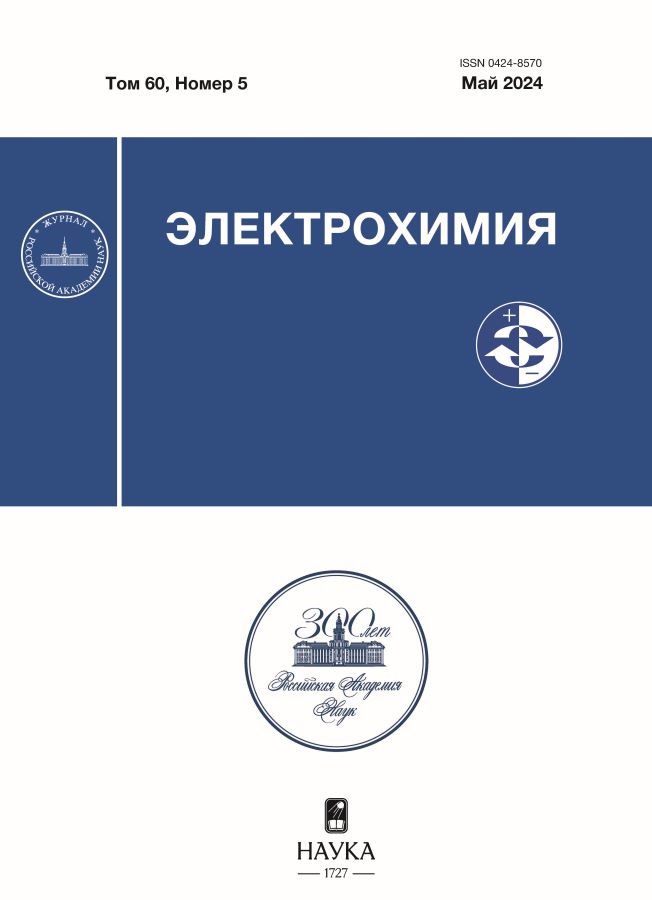Processes at platinum electrodes during the cathode polarization in alcohol erbium nitrate solution
- Авторлар: Volchek S.A.1, Yakovtseva V.A.1
-
Мекемелер:
- Belarusian State University of Informatics and Radioelectronics
- Шығарылым: Том 60, № 5 (2024)
- Беттер: 341-348
- Бөлім: Articles
- URL: https://kld-journal.fedlab.ru/0424-8570/article/view/671368
- DOI: https://doi.org/10.31857/S0424857024050021
- EDN: https://elibrary.ru/qohhtm
- ID: 671368
Дәйексөз келтіру
Аннотация
The processes at platinum electrodes during the cathode polarization in an alcohol solution of erbium nitrate are discussed. The current density maxima on the cathode branch of voltammograms were found to correspond to the potentials of the hydrogen reduction reactions. The gel-like deposit Er(OH)x(NO3)y(С2Н5О)z · nH2O, x + y + z = 3, formed during the cathode treatment was shown to be not a product of the electron exchange between the cathode and the solution components. The following formation mechanism of the erbium-containing deposit has been suggested. First, the electrochemical process of the hydrogen cathode reduction is implemented. This process leads to the ionic unbalance and causes the alkalinization of the cathode space. This creates conditions for the chemical process of the gel-like erbium hydroxide formation, which is physically adsorbed on the cathode surface as a precipitate.
Толық мәтін
Авторлар туралы
S. Volchek
Belarusian State University of Informatics and Radioelectronics
Хат алмасуға жауапты Автор.
Email: volchek@bsuir.by
Белоруссия, Minsk
V. Yakovtseva
Belarusian State University of Informatics and Radioelectronics
Email: yakovtseva@yahoo.com
Белоруссия, Minsk
Әдебиет тізімі
- Reisfeld, R., Application of luminescence spectroscopy in new materials for solar energy utilization, Online Elsevier Reference Module in Chemistry, Molecular Sciences and Chemical Engineering, 2017. https://doi.org/10.1016/B978-0-12-409547-2.11688-9
- Kenyon, A.J., Erbium in silicon, Semicond. Sci. Technol., 2005, vol. 20, p. R65.
- Феклистов, К.В., Абрамкин, Д.С., Ободников, В.И., Попов, В. П. Легирование кремния эрбием методом имплантации атомов отдачи. Письма в ЖТФ. 2015. Т. 41. № 16. С. 52. [Feklistov, K.V., Abramkin, D.S., Obodnikov, V.I, and Popov, V.P., Doping silicon with erbium by recoil implantation, Techn. Phys. Lett., 2015, vol. 41 (8), p. 788.] https://doi.org/10.1134/S1063785015080209
- Kukharchyk, N., Pal, S., Rödiger, J., Ludwig, A., Probst, S., Ustinov, A.V., Bushev, P., and Wieck, A.D., Photoluminescence of focused ion beam implanted Er3+: Y2SiO5 crystals, Phys. Status Solidi (RRL) – Rapid Res. Lett., 2014, vol. 8 (10), p. 880. https://doi.org/10.1002/pssr.201409304
- Drozdov, M.N., Latukhina, N.V., Stepikhova, M.V., Pokoeva, V.A., and Surin, M.A., Oxygen and erbium distribution in diffusion doped silicon, Modern Electronic Mater., 2016, vol. 2, p. 7. https://doi.org/10.1016/j.moem.2016.08.001
- Kimura, T., Yokoi, A., Horiguchi, H., and Saito, R., Electrochemical Er doping of porous silicon and its room-temperature luminescence, Appl. Phys. Lett., 1994, vol. 65, p. 983. https://doi.org/10.1063/1.112169
- Pourbaix, M. Atlas of Electrochemical Equilibria in Aqueous Solutions. Second English Edition. National Association of Corrosion Engineer, 1974, 645 p.
- Методы измерения в электрохимии: в 2 т., под ред. Ю. А. Чизмаджева. М.: Мир, 1977. Т. 1. 588 с.
- Фритц, Дж., Шенк, Г. Количественный анализ. Пер. с англ. Т. Н. Шеховцовой, О. А. Шпигуна; под ред. Ю. А. Золотова. М.: Мир, 1978. 557 с.
- Bard, A.J. and Faulkner, L. R. Electrochemical Methods: Fundamentals and Applications, 2nd ed.; New York: Wiley, 2001, 850 p.
- The Rare Earth Elements Fundamentals and Applications, Atwood D. A., Ed., John Wiley & Sons Ltd, West Sussex, UK, 2012, 629 p.
- Handbook on the physics and chemistry of rare earths, vol.01, Gschneidner K. A., Jr. et al. Eds., Elsevier, 1978, 900 p.
Қосымша файлдар















